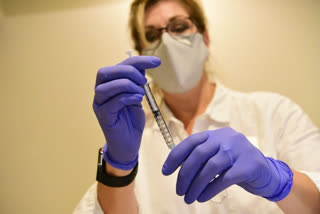Washington:U.S. health advisers endorsed a one-dose COVID-19 vaccine from Johnson & Johnson on Friday, putting the nation on the cusp of adding an easier-to-use option to fight the pandemic.
After daylong discussions, the FDA panellists voted unanimously that the benefits of the vaccine outweighed the risks for adults. Once FDA issues a final decision, shipments of a few million doses could begin as early as Monday.
“There’s an urgency to get this done,” said Dr Jay Portnoy of Children’s Mercy Hospital in Kansas City, Missouri. “We’re in a race between the virus mutating — and new variants coming out that can cause further disease — and stopping it.”
More than 47 million people in the U.S., or 14% of the population, have received at least one shot of the two-dose vaccines from Pfizer and Moderna, which the FDA authorized in December. But the pace of vaccinations has been strained by limited supplies and delays due to winter storms.
Read:|FDA says single-dose shot from J&J prevents severe COVID
While early J&J supplies will be small, the company has said it can deliver 20 million doses by the end of March and a total of 100 million by the end of June.
J&J’s vaccine protects against the worst effects of COVID-19 after one shot, and it can be stored up to three months at refrigerator temperatures, making it easier to handle than the previous vaccines, which must be frozen.
One challenge in rolling out the new vaccine will be explaining how protective the J&J shot is after the astounding success of the first U.S. vaccines.
“It’s important that people do not think that one vaccine is better than another,” said panellist Dr Cody Meissner of Tufts University.
The two-dose Pfizer and Moderna shots were found to be about 95% effective against symptomatic COVID-19. The numbers from J&J’s study are not that high, but it’s not an apples-to-apples comparison. One dose of the J&J vaccine was 85% protective against the most severe COVID-19. After adding in moderate cases, the total effectiveness dropped to about 66%.
Some experts fear that a lower number could feed public perceptions that J&J’s shot is a “second-tier vaccine.” But the difference in protection reflects when and where J&J conducted its studies.
Read:|US vaccine shows strong immune response to Covid in clinical trials
J&J’s vaccine was tested in the U.S., Latin America and South Africa at a time when more contagious mutated versions of the virus were spreading. That wasn’t the case last fall when Pfizer and Moderna were wrapping up testing, and it’s not clear if their numbers would hold against the most worrisome of those variants.
